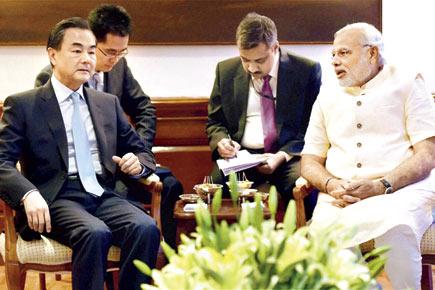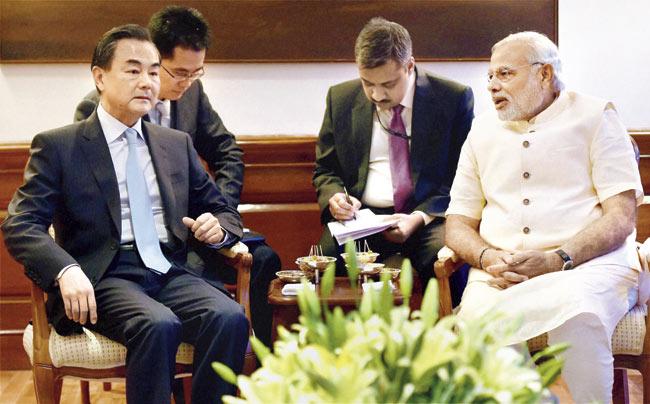The recent slugfest involving the People’s Liberation Army (PLA) on the one hand and US Defence Secretary Chuck Hagel and Japanese Prime Minister Abe on the other at the Shangri La Dialogue in Singapore was witnessed by a global audience

 The recent slugfest involving the People’s Liberation Army (PLA) on the one hand and US Defence Secretary Chuck Hagel and Japanese Prime Minister Abe on the other at the Shangri La Dialogue in Singapore was witnessed by a global audience.
The recent slugfest involving the People’s Liberation Army (PLA) on the one hand and US Defence Secretary Chuck Hagel and Japanese Prime Minister Abe on the other at the Shangri La Dialogue in Singapore was witnessed by a global audience.
The Dialogue was another indication of a sharpening contest for supremacy in the Western Pacific between China and the US, with smaller neighbours being unable to decide whether they fear China more or doubt US’ ability to stay the course more.
ADVERTISEMENT

The visit of Chinese Foreign Minister Wang Yi to India this week, so early in the Modi innings, is a good sign as both leaderships seem anxious to be able to better deal with the many challenges ahead.Pic/PTI
PLA Lt General Wang Ghuanzhong made it clear that territorial disputes in the region should be settled by those directly involved, meaning that the US had better keep out. Earlier, on May 19, in Shanghai, Chinese President Xi Ping had outlined a new Asian Security plan that was designed to exclude the US.
In Singapore, Hagel asserted that the US would not abide by China’s Air Defense Identification Zone; all nations could recommit to a regional order and the US was firmly opposed to intimidation, coercion or threat of force in the South China Sea (SCS).
China was accused of destabilising the SCS region unilaterally. Hagel added for good measure that the US was enhancing the capability of its partners to provide security and strengthening its own regional defence capabilities.
China is operating on multiple levels the South Asian sphere, where the challenge is from India; the Asia Pacific sphere, where the challenge is from Japan and the US; West Asia, where it is the US again; and against the US globally. Clearly, the stage is being set for a competition for supremacy between China and the US in the years ahead.
The world does not have just one power to reckon with anymore. Another has risen, almost. Added to this, it is also evident that although the US retains tremendous powers to destroy lesser powers (Iraq, Afghanistan), its capacity and stamina to reconstruct have been severely impaired.
The visit of Chinese Foreign Minister Wang Yi to India this week, so early in the Modi innings, is a good sign as both leaderships seem anxious to be able to better deal with the many challenges ahead. Clearly, China is challenging other major powers for a role in India at a time when its economy needs to grow at 10 per cent to recover from three years of economic slowdown.
The challenge ahead is how to overcome or circumvent challenges and security concerns and get on with what is the most important task for both countries economic and human development. It would be wise to remember other constraints on our ability. China’s economy is now four times that of India enabling it to move ahead as a global military power and giving it immense financial strength. This is still not a major challenge to the US, but it is enough of a challenge to India.
China will not give up its low-cost foreign policy objectives in Pakistan to keep India preoccupied in South Asia merely to please India. Condescending statements, like the one about paper visas to Indians being a goodwill gesture, will continue. A higher Chinese profile in South Asia and the Indian Ocean region should not be a surprise to India considering our political neglect of our neighbourhood in the last decade.
In this modern day and age, Chinese presence in our neighbourhood cannot be prevented. We need to develop strong economic and political relations with Vietnam and Japan. At least we are not arming them as China has armed Pakistan. India’s maritime frontiers are an opportunity and not an impediment, hemmed as we are by intransigent neighbours to our west and north. The sea is easily traversable, neutral, space separating us from Indonesia and Australia.
China has, in fact. acquired all the trappings of a super power money (plenty of it), a military capability that is enough to deter all others or conquer many others in the neighbourhood and without the kind of global commitments that the US has had. What it does not have is democracy, th English language or the seductive soft power of global media. Many are sceptical about this rise, but the sooner we accept that a superpower resides across our borders, the better it will be for India.
A benevolent and amicable Indian image certainly helps in making initial inroads but in the hard world of realpolitik, this may not be enough. The world respects those nations that neither complain about their situation, nor are shy of defending, protecting and furthering their national interests.
The writer is a former chief of Research and Analysis Wing (RAW)
 Subscribe today by clicking the link and stay updated with the latest news!" Click here!
Subscribe today by clicking the link and stay updated with the latest news!" Click here!







